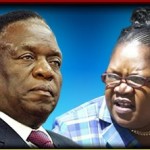The coming of the New Year was welcomed by stirrings of political factionalism within Zanu-PF, the ruling party in Zimbabwe. This time it was not our usual culprits. Rather, as mortality dawns on the old man and with Morgan Tsvangirai out of the way, two of ZANU –PF’s heavyweights furtively eye the presidential seat. Vice President Joice Mujuru and Justice Minister Emmerson Mnangwaga are reported to be keen combatants for the presidential candidacy. The contest between the two, it is said, will decide the future of Zimbabwean politics.
Mrs Joice Mujuru rose to prominence off the back of the chimurenga; the Rhodesian Bush War, serving as the first woman commander in Mugabe’s ZANLA forces. Since then, she has assumed several ministerial portfolios. She commenced her career as the Minister of Community Development and Women’s Affairs (1980-85) and occupied several positions between 1997 and 2004, before finally settling in her current role as the Vice President of Zimbabwe in 2007. Throughout her political career she has remained steadfast and loyal to Mugabe and rarely criticises the Party. Like other veterans of the Bush War she blames western sanctions for the country’s crippling economic conditions. That is not to say that Mujuru completely embraces the controversial economic nationalist agenda that passed into law under Mugabe as the Indigenisation and Economic Empowerment Act in the summer of 2008. The economic indigenisation agenda simply forces large corporations and foreign businesses to surrender a majority stake in shares to the government. Quite the contrary, Mujuru is a firm believer in free markets and privatisation, and so warms to foreign businesses and investments as a way of improving the country’s relations with the international community.
Where Mujuru falls short, her opponent Mnangagwa excels. He is often referred to as the blue-eyed boy of Robert Mugabe. Since joining the Party, he has presided over such important ministries as the Minister of State Security, Finance, Rural Housing and Social Amenities, and finally assumed the role of Justice, Legal and Parliamentary Affairs. At one point, he also served as the speaker of parliament. Nicknamed ‘crocodile’, he is a cunning political strategist who is feared by his enemies. His previous positions have found him close to the president’s office, either in the capacity of Chief of Security or Legal Adviser. Unlike his opponent he fully supports Mugabe’s economic agenda and is more likely to maintain the status quo. In addition, he also shares his master’s antipathy towards the West. On the eve of July 2013, Mnangagwa appeared next to Mugabe in a press conference, which sparked up rumours that he was the chosen heir.
It is often said that the son closest to his father inherits the throne, but it would be careless to underestimate Mujuru’s popularity within the Party. Her moderate centrist approach resonates well with those members fed up with the oligarchic control by the Party’s leadership – the president and his coterie of securocrats. Also in the provincial election, at the end of 2013, Mujuru’s faction demonstrated their popularity amongst the people by winning control of nine out of Zimbabwe’s ten provinces, although her victory was undermined by allegations of voter intimidation and fraud. For what it’s worth, this contest might not necessary be determined by the appointment of the ageing president. The mood within party members and popular sentiments are bound to also have an impact.
So it may seem, yet judging by the nature of Zimbabwean politics, which throughout the 34 years of Mugabe’s rule has been steered by the security intelligentsia-securocrats, it is very difficult to categorically state that the battle would be fought over popularity and ideologies instead of vested political interests. Many suspect that Mnangagwa would call on his chums within the ruling securocrats for support. With their backing and the favour of the president still shining on him, he seems to be a good ticket to bank on.
For most Zimbabweans, Muguru and Mnangagwa are different pockets of the same trousers. Whichever one of them succeeds the old man does not make an iota of difference, since they are more than likely to maintain the existing modus operandi – politics of the belly – by concentrating on enriching the minority ruling elites, whilst the majority of the population scrounge for a living. Nevertheless, the brewing factionalism is fated to split the Party, allowing for new alliances to emerge on the political landscape. Come what may, when the old man finally retires, the fight for a successor would certainly change Zimbabwean politics as we have known it for the past three decades.









